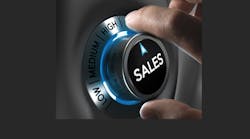We discussed how distributors who have shifted their sales culture from merely taking orders to proactive selling have seen great success, universally increasing sales by at least 8% per rep. And we also talked about how plenty of distributors know about that success and yet are still hesitant to adapt.
I asked him why so many distributors are reluctant to change how they sell, particularly going from a reactive sales approach to a proactive, consultative approach, and his answer was simple: “They’re scared of their sales reps.”
Who could blame a distributor for feeling like their sales reps have all the power? After all, they own customer relationships, and nothing’s stopping them from taking those customers with them if they leave the company.
But when a distributor fears its own sales reps, the result is compounding disarray:
- Compensation plans become misaligned with company objectives because sales reps aren’t incentivized to expand wallet share by pitching customers on new product categories.
- Institutional knowledge goes undocumented because sales reps don’t have to track their notes, activity, and information in a centralized system like a CRM.
- Online stores languish because sales reps see e-commerce as competition rather than a way to leverage more customer insights to grow the business.
Those not aligned culturally were let go or left of their own accord, including high performers. But everyone else thrived, and so did the business. As expected, the departure of a few sales reps led to some customer churn. But revenue and growth didn’t suffer, even in the short term! A values-led culture that prioritizes the customer and business objectives is extremely resilient and poised for long-term success.
DO YOUR SALES REPS WANT TO SELL?
Many of today’s sales reps don’t want to be too sales-y. Trying to convince someone to spend money on something is uncomfortable, so they avoid that discomfort by becoming order-takers. And order-taking can take on many forms: If your field reps just bring their customers donuts and ask if they need anything, they’re order-takers. If your inside sales reps just call around to “check in” occasionally, they’re order-takers. They might as well be customer service reps.
Put another way, if your sales reps aren’t engaging in open-ended consultative discovery conversations with customers or offering tailored recommendations, you’re leaving money on the table.
So, what does it mean to be a proactive and consultative sales rep? A proactive sales rep will review what’s going on with the account before a call to find out:
- How are the customer’s numbers compared to last year?
- Is spending down in any particular categories?
- What are items they order regularly, but have failed to order lately?
- What are some wallet share expansion opportunities? What are similar customers purchasing from the company that this customer is not?
When a proactive sales rep visits a customer in person or calls them on the phone, they are prepared to ask the right questions and make the right recommendations. For example, they might ask:
- “I noticed you’re not buying [product] from us anymore. Did I lose that business?”
- “A customer in my other territory with a similar business model to yours is also buying [product category] from us. Where do you currently source your (product category)?”
AI technology can help identify these opportunities, but the rest of it is rooted in culture. And culture starts from the top.
HOW TO BUILD A CULTURE OF PROACTIVE SALES
To start a revolution, which is what the regional president did at his electrical distribution business, you need to have clearly defined values you can point to. You can’t be vague or wishy-washy because it’s too easy for your reps to skirt your supposed values and keep doing the same old, same old. And you also need to demonstrate those values. Every time you interact with your team or with a customer, you should make a concerted effort to incorporate one or more of your chosen values into the interaction.
Here are some values that can help any distributor change their sales culture to be more proactive:
Customer-centricity
Placing the customer at the center of all decision-making and focusing on understanding their needs, goals, and pain points.
Empathy
Showing genuine concern for the customer and striving to help them overcome those pain points.
Adaptability
Embracing change and staying agile to respond effectively to evolving customer needs and market conditions.
Innovation
Constantly seeking new and creative ways to solve customer problems and improve the overall customer experience.
Mutual trust
In 1949, the Mann Gulch Fire in Montana took the lives of 13 wildland firefighters who found themselves trapped between the fire and a steep ridge. One of the surviving “smokejumpers” was the team’s leader, Wag Dodge, who devised an “escape fire” to save himself and his teammates. Although he urged them to join him, they didn’t understand his plan and continued running uphill to their demise. While distribution sales aren’t life-or-death, Dodge’s story highlights the importance of building mutual trust in a workforce so that people follow leadership in critical situations.
For a culture change to “take,” leadership must fully embrace and embody the changes. Proactive selling shouldn’t be seen as the passion project of a few managers but rather as a company-wide commitment by everyone. Establish the Hawthorne effect by making it clear that sales representatives are evaluated and recognized based on their ability to engage in consultative selling rather than passively waiting for customers to approach them with their needs.
CULTURE CHANGE IS HARD, BUT THE RESULTS ARE WORTH IT
Distributors who disrupt the status quo and transform their sales culture, expecting sales reps to act as sales consultants see remarkable results. MSC, for example, went from having a “100% reactive” customer service team to generating $15k in upsell/cross-sell revenue per rep per year – 20 times more than what they were doing before. CEO Erik Gershwin set the tone by instilling customer-centric values and facilitated the change by giving CSRs AI-powered tools to help them make timely, relevant recommendations.
R.S. Hughes did the same, arming all teams with AI to proactively suggest recommendations through calls, emails, or in-person interactions. As a result, the company’s 175 inside sales reps became much more proactive, and they collectively make recommendations to 10,000 customers monthly.
According to DSG, increasing customer retention by just 1% per year over a decade can lead to a 20% increase in annual earnings. The occasional box of donuts might lead to an increase in customer retention, but it isn’t scalable and it’s an easy tactic for a competitor to replicate. A much more defensible, revenue-generating approach is to help the customer with their business by forming a deep understanding of their needs and being able to predict those needs. Delivering donuts makes you, as a sales rep, replaceable. Being a trusted advisor to a company makes you irreplaceable.
Proactively nurturing accounts and pinpointing their needs to make tailored recommendations can help grow midsize accounts by 15 to 20% and increase your gross profit through higher-margin accounts.
If you create a proactive sales culture, you may lose a few reps and a handful of customers with them. But the reps who stay will generate a lot more revenue in the long term. You’ll be able to sell more to your existing customers because you’ll have consultants who don’t wait for customers to tell them about their needs, they will be actively spotting wallet-share gaps and categories where purchasing is starting to slip, and be able to step in before a customer churns. Your reps will trust you, and you’ll be able to trust them. And fear won’t even enter the equation.












